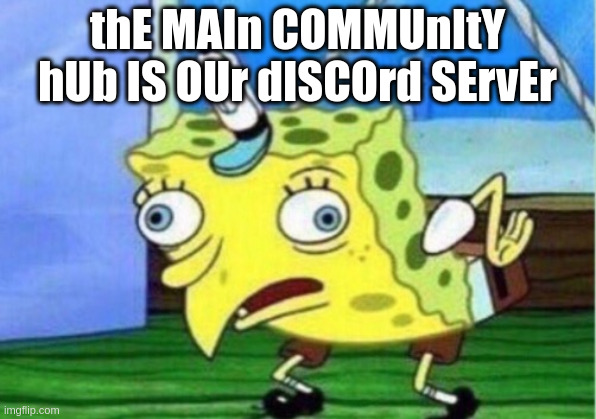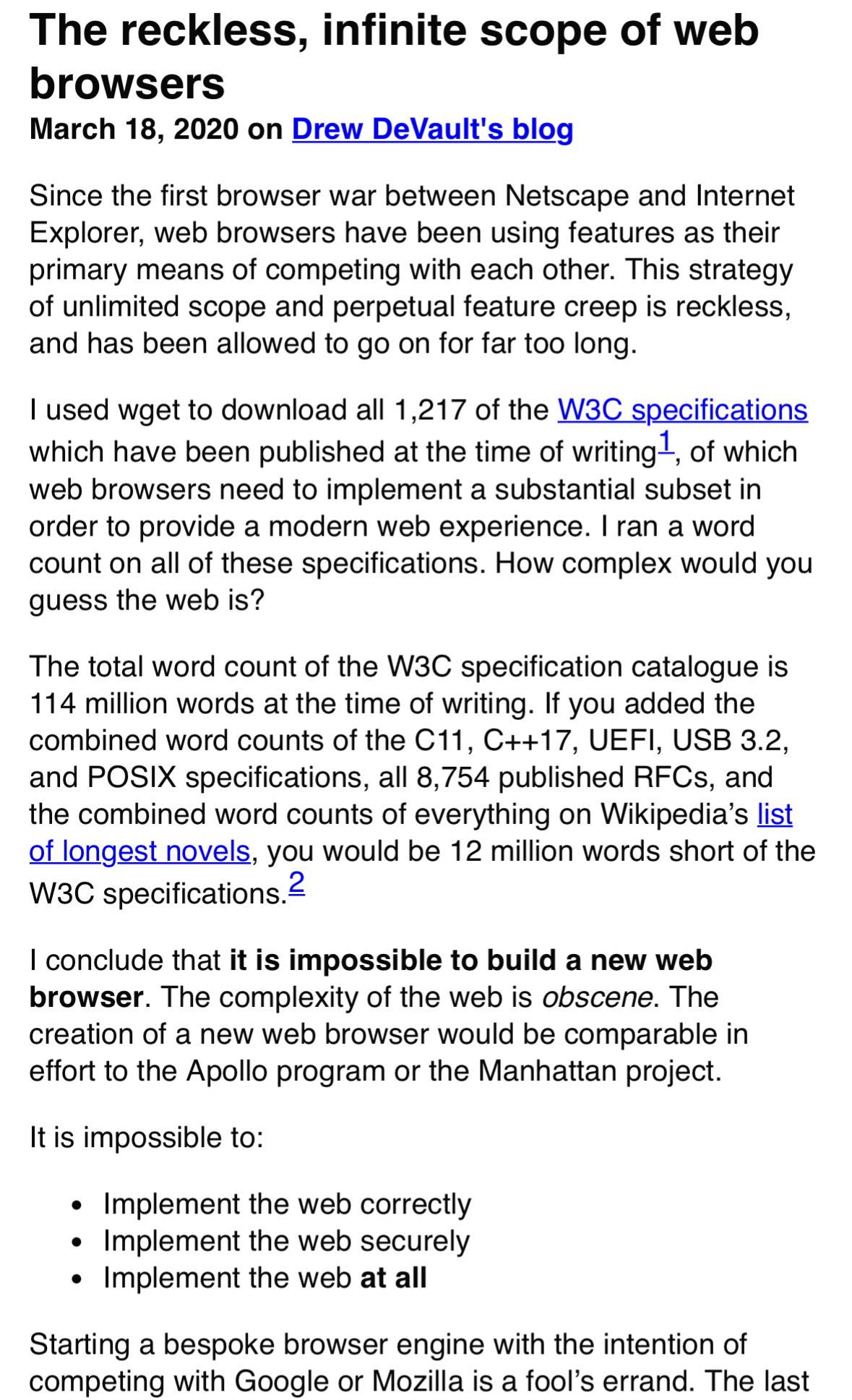- cross-posted to:
- technology@lemmy.world
- cross-posted to:
- technology@lemmy.world
The website makes it sound like all of the code being bespoke and “based on standards” is some kind of huge advantage but all I see is a Herculean undertaking with too few engineers and too many standards.
W3C lists 1138 separate standards currently, so if each of their three engineers implements one discrete standard every day, with no breaks/weekends/holidays, then having an alpha available that adheres to all 2024 web standards should be possible by 2026?
This is obviously also without testing but these guys are serious, senior engineers, so their code will be perfect on the first try, right?
Love the passion though, can’t wait to see how this project plays out.
Let’s not do zomething because it’s hard pretty much sums up every new generation.
Imagine if they said that when they had to program everything in assembly…
Software nowadays is a lot more complex. You’d get nowhere using assembly. Are you also gonna call me lazy if I say making a smartphone from scratch is complicated? “But the Nokia 1234 only had 4kb of memory” Is what you will probably say.
You’d get nowhere using assembly because people wanted to keep improving technology.
The Nokia was actually build and freakin’ rock solid. Then came smartphones because people wanted to improve. It sure wasn’t easy and they didn’t go Geez, a phone from scratch? Why bother?
Wait, 1138? If there are any Star Wars fans in there, there won’t be more.
You are assuming that they only started now from point 0. They have probably been working on it for a bit before announcing everything.
They say they already use it to manage GitHub issues so it’s definitely more than “point 0” right now.
Exactly. They have been working on Ladybird Browser for few years already, before it was announced as standalone product (It was a part of SerenityOS).
And it passes the Acid3 test, which is more than Firefox does.
W3C lists 1138 separate standards currently, so if each of their three engineers implements one discrete standard every day, with no breaks/weekends/holidays, then having an alpha available that adheres to all 2024 web standards should be possible by 2026?
Yes, that is exactly the plan: “We are targeting Summer 2026 for a first Alpha version”
They’ve been at it for four years and they plan to have an alpha by 2026. Maybe wait how it actually turns out?
a Herculean undertaking with too few engineers and too many standards
Yeah, as a layperson this is my take. If mozilla is struggling to stay in the game then I just don’t really see how an unfinanced indie team has a shot.
Mozilla has loads of projects, not just the browser. I doubt more than a 30 work exclusively on the engine nowadays.
Even if that were true, and it seems unlikely, that’s still an order of magnitude more than the ladybug devs.
Let’s not forget that Mozilla (the company) is largely mismanaged, so that doesn’t help.
It might seem that way but it’s a fairly arrogant assertion. They’re a sophisticated organisation with a lot of well experienced people guiding them. As an outsider it’s easy to criticise their seemingly endless series of bad decisions, but I’m still confident that internally all of these decisions seemed like a good idea at the time.
Besides which, this would be a good reason to fork their codebase rather than starting from scratch.
Sure, but an individual website may use only a few of those standards. Ladybird devs will pick a website they like to use - Reddit, Twitter, Twinings tea, etc. and improve adherence to X or Y standards to make that one website look better. In turn, thousands of websites suddenly work perfectly, and many others work better than before.
Ladybird is largely conformant to the majority of HTML standards now. It’s about the edge cases (and where standards aren’t followed by websites) and performance. This isn’t a new project.
Lol, mentioning Twinings tea together with Reddit and Twitter sounds so random
Andreas Kling, the founder and lead dev, has a massive love for Twinings tea and spent a few Dev logs working on improving their website with the end goal being ordering his tea from them :)
That is a nice little tidbit of information :)
is it open source?
Kudos to them. Opera gave up on this dream being unable to accommodate all the nuances of web standards and accounting for out of conformance behaviours that many websites rely on the daily.
I reckon this browser will need to be at least on par with reasonably recent version of Firefox to see significant adoption.
I still mourn the death of Presto-days Opera.
I do too. What a joke the browser became after moving to Chromium… I remember it didn’t even have bookmarks in the first version.
On the flip side I kind of understand the decision to pull the plug - if you’ve looked at
Browser.jsand think that potentially any site might need a fix to work properly…
I do not understand the urge to start from scratch instead of forking an existing, mature codebase. This is typically a rookie instinct, but they aren’t rookie so there’s perhaps an alternative motive of some sort.
There is currently no implementation of web standards that is under a more permissive license than LGPL or MPL. I think that is a gap worth filling and if I recall that is what Ladybird is doing.
Why is that a gap worth filling? There is no benefit to users as long as its free of a EULA they don’t have to care either way. For those wanting to produce open source software based on same they already have all the rights they could need. The only party clamoring for permissively licensed software are companies intending to close off the source and sell other people’s work.
I understand why they would want to do that I don’t understand why anyone would feel the need to work for free for something someone else closes off.
There are some cases where it’s just not possible to release the source code, even if you wanted to.
For example, if you’re developing a Nintendo switch game, you aren’t allowed to release any code that uses Nintendo’s sdk, so that means you also can’t use any copyleft libraries.
Maybe MPL-licensed libraries would be ok though. Idk, I’m not a lawyer.
Why would open source code be released with the intention of helping people who wont or can’t give back?
Why not?
I’ve been in situations where I couldn’t release the code to a project, but I was able to use some decent libraries because they were MIT licensed.
So I’m happy to do the same for libraries I write so that others in similar situations could also receive the same benefit I did.
I see it as an act of public goodwill, like paying it forward for the times you can’t directly contribute to another project.Just my personal view on it, anyway.
I’m not claiming it’s a bulletproof solution or that it isn’t open to being ‘abused’.It’s an act of public goodwill to rich corporations who could get the same privilege by paying for a separate license.
I guess Chromium isn’t fully BSD. This could be the reason. Although I’d think reimplementing the non-BSD bits in Chromium would be less work than reimplementing all the bits, including the BSD ones.
Chromium and WebKit both still have bits from KHTML in them which is LGPL
i’d argue its better for software to max foss license like AGPL, not bsd that can be taken out by companies
I can’t understand how people can continue relying on chrome and derivatives like electron, CEF etc. and not see it as a problem.
It’s easy to understand when you think most comments are similar to yours and don’t provide any insight as to why this might be a problem.
Maybe you could update your post and share your knowledge and experience with others, so that there are less people in the world who don’t see the problem.
When trying to render a relatively simple page consisting few thousands of text lines in a table, any current browser will cause mouse cursor to lag for some time, then you’ll discover it consumes at least 2 GB ~ 4 GB of RAM. YouTube lags like I have 2 cores instead of 16. Any electron app is either clunky or too clunky, also either hungry or too hungry.
I’m sorry but I don’t have time to look up other cases.
Any intuition on why we’d expect opening the same page on a newly implemented browser engine that implements all equivalent standards and functions will consume less resources?
Ladybird was born from SerenityOS, which is a hobbyist unix-like (or POSIX compliant?) OS that simply aimed to do things “from the ground up”. It just happened that they needed to make a browser, and the response was to make one from scratch.
From there it seemed to have brought a lot of attention organically to the point where it can stand on its own, but originally it was never intended to be a “third browser engine” from its inception.
That actually makes the most sense. So similar to how Linux was started.
Because software monocultures are bad. The vast majority of browsers are Chromium based. Since Google de-facto decides what gets in Chromium, sooner or later the downstream forks are forced to adopt their changes. Manifest V3 is a great example of this. You can only backport for so long, especially when upstream is being adversarial to your changes. We need an unaffiliated engine that corrects the mistakes we made with KHTML/Webkit.
Why are open source software monocultures bad? The vast majority of non-Windows OSes are Linux based. Teams who don’t like certain decisions of the mainline Linux team maintain their forks with the needed changes.
Manifest V3 is a great example of this. You can only backport for so long, especially when upstream is being adversarial to your changes. We need an unaffiliated engine that corrects the mistakes we made with KHTML/Webkit.
And we could get a functional one today by forking Chromium and never accepting a single upstream patch thereafter. I find it really hard to believe that starting a browser engine from scratch would require less labor. This is why I’m looking for an alternative motive. Someone mentioned licensing.
Perhaps some folks just want to do more work to write a new browser engine. After all Linus did just that, instead of forking the BSD kernel.
I agree mostly, but forks don’t need to keep the upstream. They can go their own way.
Because there are only like 3 browser engines: Chrome’s Blink, Firefox’s Gecko and Apple‘s WebKit. And while they are all open source, KHTML, the last independent browser engine got discontinued last year and hasn’t been actively developed since 2016.
There’s need in the space for an unaffiliated engine. Google’s share is far too high for a healthy market (roughly 75%), WebKit never got big outside of Safari (although there are a few like Gnome Web, there’s no up to date WebKit based browser on Windows) and Gecko has its own problems (like lack of HEVC support).
So, in my book, this is exciting news. Sure it‘ll take a while to mature and it is up against software giants but it‘s something because Mozilla doesn’t seem to have a working strategy to fight against Google‘s monopoly and Apple doesn’t have to.
WDYM “independent” ?
Isn’t mozilla / gecko more or less independent?
They get most of their money from google for the “default search engine deal” make of that what you want. For me personally it doesn’t sound fully independent.
Seems a little idealistic.
If ladybird actually achieves any sort of userbase they would take the same deal in an instant.
Based on the community being quite succsessful so far despite being made by volunteers, I don’t think they will.
Making a web browser that’s fully compatible with modern standards is not easy nor cheap (and worse it’s a moving target because the standards keep evolving). I’m rooting for these folks but eventually money will be an issue.
Oh my sweet summer child.
Webkit and blink have the same base
Yea, but Webkit was forked from KHTML 23 years ago and Blink was forked from WebKit 11 years ago. In the mean time they all definitely evolved to become their own thing, even though in the beginning they were the same.
Also Gecko’s development is led by people thinking that it being usable outside of Firefox\Thunderbird is a bad thing. There was a time when Gnome’s browser was based on Gecko, not WebKit. And in general it’s influenced by bad practices.
SerenityOS is an amazing project, of course. To do so much work for something completely disconnected from the wider FOSS ecosystem, and with such results.
So it’s cool that they’ve decided to split off the browser as its own project.
That’s always struck me as odd, but I’m also very much an outsider looking in. A “gecko electron” does sound intriguing though.
Servo is going to fill that void
I meant alternative browsers, like vimb or surf, but on Gecko and not WebKit.
I wonder why Microsoft decided to switch from their own engine to Blink, they could’ve switched to Gecko and keep the web a little bit more free
Why would Microsoft care?
webkit and blink are based of KHTML
Technically blink is based WebKit but yes. However, they were forked 23 and 11 years ago respectively, so it’s safe to assume they evolved into their own thing. But they probably do still share code, yes.
Mozilla doesn’t seem to have a working strategy
Guess they couldn’t replicate the “own everything that people use to get stuff on the internet and make secret breaking changes to constantly mess up other browsers” strategy.
Could they not add HEVC support? Or is there some technical limitation that meant starting from zero was a good idea?
They could, probably. My guess is, that it’s either a limitation of resources, the issue of licensing fees or Google‘s significant financial influence on Mozilla forcing them to make a worse browser than they potentially could. Similar to how Firefox does not support HDR (although, to my knowledge, there’s no licensing involved there).
The biggest problem most people have with Mozilla is said influence by Google, making them not truly independent.
If 50% of firefox users donated 2 dollars per year mozilla could work for people instead of Google or at least people AND google
The problem is, most user don’t want to pay. And every time mozilla tries to monetise differently they get community backlash…
Google probably is putting pressure on Mozilla, but if the options are licensed HECV or open royalty-free AV1, the choice is pretty clear for a FOSS project.
Yes but: HEVC is the standard for UHD content for now, until AV1 gets much broader adoption. And judging from how long HEVC took to be as broadly available as h.264, it’ll still take a while for AV1 to be viable for most applications.
The good news is no streaming service even supports UHD in browers (except Netflix on Edge?) because of DRM. So I don’t see the value.
My Jellyfin server does and on Firefox it needs to transcode to h.264
Yeah I’m curious as to whether there’s not merit in taking the imperfect codebase and improving it.
I suppose Mozilla is already doing that as best as they can.
HEVC is almost entirely down the the licensing. This section of the wikipedia page details it pretty well.
The tl;dr is that the LA group wanted to hike the fees significantly, and that combined with a fear of locking in led to the mozilla group not to support HEVC.
And it’s annoying at times. Some of my security cameras are HEVC only at full resolution, which means I cannot view them in Firefox.
No webkit browser on Android either. If there was gnome web for Android id switch in a heartbeat
Does anyone know why there are barely any WebKit based browsers? WebKit is open source and at least Safari works really well. Is it hard to work with? Do people just hate Apple that much? Is there some limitation?
Also, WebKit was based on KHTML, which was open source and platform independent itself.
C++
If they’re starting a browser from scratch, why would they not have chosen Rust? Seems very short sighted to not have learned from Firefox.
@asdfasdfasdf@lemmy.world There’s Servo ( @servo@floss.social ), it’s a browser engine written in rust
@Diabolo96@lemmy.dbzer0.com
Yes, that’s what I’m referring to. They could build on that, or they could write something their own in Rust. But I’d think building on Servo would be fantastic.
I know about servo. It was pretty much a dead project until they joined the Linux fondation last year and started getting some sponsorship. Since then, they being doing pretty good on there own with personal donations rising by around 20% each month, reaching more than 2000$ monthly. Wish them all the best!
Must be planning on actually shipping something
/s
Ship what, segfaults / invalid memory access? Lol
CVEs lol
They used c++ initially since it was spawned from SerenityOS, which was designed to be a mashup of win2000 and unix.
now that Ladybird is its own project, it’s not constrained to that goal, and they have said they will incorporate modern languages.
Glad to hear that!
I hope this pans out, because I’ve long ago lost hope on Firefox being a worthy alternative to Chromium.
Have you used Firefox recently? There are a few chrome only sites but I’ve been daily driving it for a few months and it’s mostly upside
I can no longer play any podcast hosted on Apple podcasts, which is a distressing amount of them.
They work just fine in Chromium.
Fair enough, I capitulated and I use spotify for podcasts now
deleted by creator
The only reason I dont use spoitfy, which one particular show was available on both, is because it doesnt support my RSS feed.
You can use the app cider for that (Oh, it is a Electron app 😂🙈)
Huh, I just went to the website to try and it worked for me
Firefox has been perfectly capable for the entire time it has existed. What are you talking about?
Servo already exists and is independent and written in a modern language and way ahead of this.
I mean, competition is good but they aren’t the only independent browser engine.
It’ll be interesting to see how this plays out. I’ve had more than a handful of people bitching at me that it’s impossible to make a new, open web browser in this day.
Interestingly the founder of the project seems to explicitly disagree with that article
Their rendering engine is already pretty solide (see penultimate video in their channel). Now that their “no third party” restriction is lifted, they can actually focus on building a browser engine instead of recreating 30 years worth of technologies from scratch.
I think it’s less that it’s “impossible” but rather that it’s expensive.
Honestly we’ve in general shoved too much shit into the browser that’s not strictly related to just browsing web sites.
And you “have to” support all the layers and layers and layers of added stuff, or you can’t “compete”.
But, at the same time, the goals of making a good-enough browser that mostly works and isn’t completely enshittified and captured by corpo big tech interests is a very worthy project and 100% support what they’re doing.
I feel like the internet is such a lost cause at this point that it would be better to invest in other efforts like the Gemini protocol.
Gemini protocol
IDK, but I don’t think that the problem is that any particular application protocol is bad so much as it is capitalists going to capitalist, and they’ve shit all over everything in the Quest to Make a Buck.
It’s not like a new protocol, if it becomes as widely adopted, won’t see the same vultures swoop in and strip mine any value they can find there, too.
A more lightweight protocol limits the attack surface for capitalism. The web sucks because basically anything can be wrapped in http, including ads, tracking cookies, JavaScript, etc.
Gemini protocol only carries markdown
That’s a fair assessment. I’ll admit to having a severe case of doomerism when it comes to tech lately, and the levels of shit tech bros will go to to monetize shit has me skeptical there’s any sort of protocol or technology that could be made bro-resistant for more than a short period of time.
EEE is pretty prevalent and has been a very standard practice with these tech companies for a long time. See: Meta and Threads for a recent example.
No, I’d have accepted too expensive as an answer. They were ready to die on the hill that no one could possibly create a new browser from specs.
Hilarious, I suppose, given the origins of Chrome and that it was a team of people sitting down to make a new browser from the specs.
My thoughts exactly.
Also nothing is stopping someone from forking an open browser and throwing money/bodies at keeping it up.
It’s be a shame to lose free updates, but certainly not undoable.
Agreed. As much as I understand the urge to build your own shiny new thing, I’d pay real actual human money for someone to take Blink, and put it in a non-lobotomized, non-enshittified, non-garbage UI that has things like a self-hosted sync server, built-in adblock/noscript/etc, and the ability to use extensions for things like password managers.
But no crypto stuff, no gaming stuff, no VPN services, no browser password managers, no sponsored links, no sponsored default search engines, no email client, blah blah blah.
Browser, adblock, self-hosted sync, done.
JavaScript was a mistake.
And it went downhill from there.
It was fine when it was contained to an actual web site instead of infecting desktop software too. To me, using JS for that purpose feels like using PHP to write a 3D video game.
using PHP to write a 3D video game.
Somewhere, someone just had a really bad idea.
It’s a general language (though primarily adopted by web as backend engine), so you can basically expect people already have had this idea.
Eh, scriptable content was probably fine.
Techbros going ‘holy shit, we should make EVERYTHING a website!’ was the curse that doomed us.
Pushing for bloated web apps instead of having optimized and perfectly functional websites was what killed it for me.
or you can’t compete
Nah nah fuck that noise. ‘Jack of all trades but ace of none’ or however the saying goes, is a shitty way to go about things. I don’t have the biggest dick but I know my way around around the block, and I know I’m good at it. More specialized > the catch-all bitches.
Let the fucks with their special engine requirements eat shit. Standardize or write a fucking proper program (miss me with that “app” bullshit) or fuck right off. “everyone is special… exactly like you” now fuck off web dev. Your shit doesn’t get a permit.
…
I may have some… disputes with the way the web is done nowadays.
I could have been a little more clear: I don’t think the whole must-compete-or-forget-it mindset makes any damn sense.
I’m more than happy to use software that does what I want/need (which, more and more, is simply just not fucking spying on, trying to sell things to, or otherwise annoying me) even if it’s not like, the most bestest version of whatever.
Good luck!
I want to follow updates from this project. They have a Twitter account but not Mastodon sigh

RSS is not even enabled on the Newz page on the website.
Im glad to see this. Discord is a nightmare. It’s the same as a Facebook only group to me.
I agree, but (hot take) I think that Discord is even worse than Facebook.
I share the disappointment.
I found they have a newsletter, that sounds like an acceptable middle ground, not good, not terrible.
It’s hard to understand the purpose of this. The difficulty of the project (i.e. complexity of the web) is the real problem that needs solving. We don’t need another fork of the browser-verse. We need a fork of the web itself.
Considering how much Google has entrenched itself into the Internet (see manifest v3 fiasco), I would argue that creating a new browser is a fork of the web
They have a fork of the web. Its called the dark web. They use it to sell hookers and drugs.
We also have a fork of money, it’s called crypto and it’s used to sell and buy hookers and drugs. Every fork of something end up used to buy hookers and drugs. Truly marvelous!
I mean…yes?
It’s also used to buy baking pans, dove soap, coffee makers, and toasters. Xmrbazaar.com
Uhhhhhhhhhh
How many of those listings are code for something?
Is it true that there is no truly independent web browser or are there others?
Laaaaaaaaadybird.
The comment I came here for 🐶
We’re gonna have to put laaaaaaaadybird down… Mr Hill?
The project management may have some obvious problems (jOin dIsc0Rd sErVEr; w0rD “thEy” t0o p0liTicAl). But we really need an alternative to browsers funded by Google (Chrome and Firefox).
So I’ll do my best to actually build from sources and see what can I help with. Attacking the author is helping nobody.
And for the folks who are saying “wHy n0t rUst”, you can always show me the (rust) code.
And for the folks who are saying “wHy n0t rUst”, you can always show me the (rust) code.
https://github.com/servo/servo
I really wish they would publish flatpaks because I can’t be arsed to either build the thing or get a non-standard precompiled binary to run on nixos.
Well, thank you for pointing me to this project. Didn’t know about it. I’ve just built it. So, the part of I’ll do my best to see what can I help with applies here to.

Wasn’t this the transphobic one?
Shoutout to the user pointing out that forcing “he” is just as, if not more, political ❤️
i like how they’re like this isnt the place for personal politics while ignoring the fact that gendered readme files are patently stupid in the first place.
Changing to gender neutral seems like a no brainer to me but how is this transphobia?
Brave?
Don’t believe they’re related
Brave is the one run by transphobes who also love crypto.


































